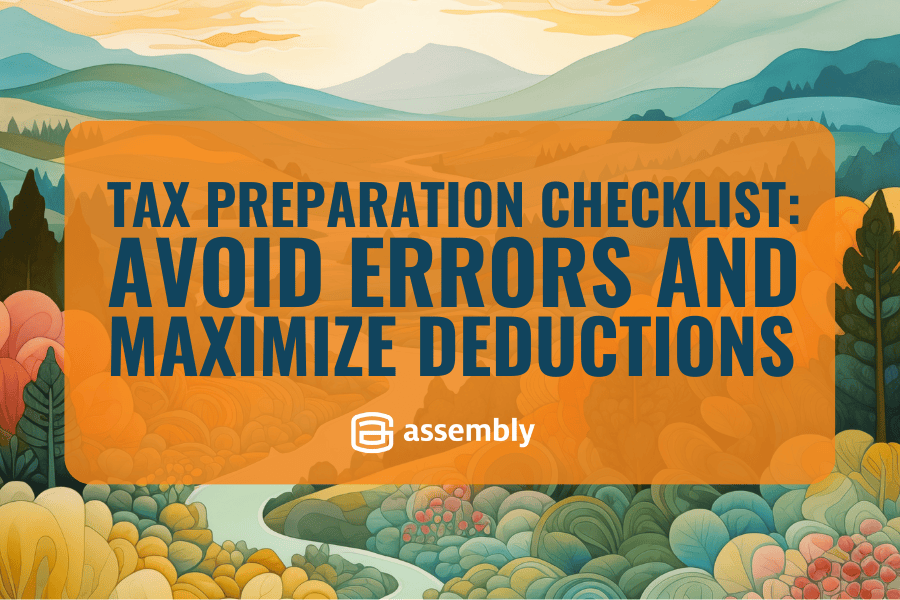Tax Preparation Checklist: Avoid Errors and Maximize Deductions
Tax season can be stressful, especially if you start just a few weeks before the filing deadline. Avoid tax-time panic by gathering required...
4 min read
 Doug Hutchinson
:
July 10, 2025
Doug Hutchinson
:
July 10, 2025

The 2025 budget reconciliation bill includes a mix of new deductions, extensions to provisions from the 2017 Tax Cuts and Jobs Act and a phase-out of clean energy credits. To help you make sense of it all, we have clear, straightforward answers to frequently asked questions about how the 2025 budget reconciliation bill (aka Trump’s big bill) may affect you.
Some provisions of the 2017 Tax Cuts and Jobs Act (TCJA) are now permanent.
There’s also a new bonus standard deduction for seniors $6,000 ($11,200 for married couples) for those over age 65. Seniors with incomes of more than $75,000 (single) and $150,000 (joint) receive lower bonus deduction amounts.
The TCJA capped State and Local Tax (SALT) deductions at $10,000 per year. The new bill raises this cap to $40,000 for most taxpayers.
Yes. For new vehicles purchased after December 31, 2024:
This deduction is available for taxpayers who itemize deductions and for taxpayers who use the standard deduction. But the $10,000 deduction begins to phase out at an income threshold of $100,000 for single filers and $200,000 for joint filers.
Partially. Only when tips surpass $25,000 or if taxpayer income exceeds $150,000 (single) or $300,000 (joint).
Up to $25,000 in tips are deductible if:
Workers can also deduct up to $25,000 for joint filers or up to $12,500 for single filers in federal income taxes paid on overtime wages. Only the overtime premium (e.g., time-and-a-half portion) is deductible. The deduction starts to phase out at the income levels mentioned above.
Good to know:
The reconciliation bill increases the amount taxpayers can deduct for charitable donations. Taxpayers who take the standard deduction may now deduct up to:
…for charitable contributions made during the tax year.
Note: These deductions will not go into effect until the 2026 tax year.
There are two key expansions: for K-12 expenses and credentialing programs.
#1 K-12 Expenses
Qualified expenses now include textbooks, tutoring, and standardized test fees.
#2 Credentialing Programs
Funds from 529 plans can be used to pay for:
Gym memberships are now HSA-eligible, with a $500 cap for single single filers and $1,000 for joint filers.
Also, HSA contribution limits increase by $4,300 (individual) and $8,550 (family). The reconciliation bill essentially doubles the current HSA contribution limits starting January 1, 2026. That said, the increased contribution limits phase out for taxpayers with an AGI above $75,000 (single) and $150,000 (joint).
Four clean energy credits are being eliminated early:
Mark your calendar. Make a note of when applicable provisions start and end. For example, you have until the end of 2025 to invest in energy-efficient home improvements.
Check income thresholds. Many benefits phase out at different AGI levels.
Talk to a Wealth Manager: Financial planning is personal. A professional can help you adjust your tax strategy and investment plan to help you meet your goals.
We’re here to help. Contact Assembly Wealth for personalized guidance on how the Reconciliation Bill impacts your taxes and financial plan. You can connect with us online or by phone (415) 541-7774.
Related Reading:
Disclaimer:
Assembly Wealth (“Assembly”) is an SEC registered investment adviser; however, this does not imply any level of skill or training and no inference of such should be made. The opinions expressed herein are as of the date of publication and are provided for informational purposes only. Content will not be updated after publication and should not be considered current after the publication date. We provide historical content for transparency purposes only. All opinions are subject to change without notice and due to changes in the market or economic conditions may not necessarily come to pass. Mention of a security should not be considered a recommendation or solicitation to purchase or sell the security, and any securities mentioned may be held by Assembly for client portfolios. This material has been prepared for informational purposes only, and is not intended to provide, and should not be relied on for, tax, legal or accounting advice. You should consult your own tax, legal and accounting advisors before engaging in any transaction.
Information presented represents an opinion as of the date published and should not be considered an investment recommendation. Assembly does not become a fiduciary to any listener, reader or other person or entity by the person’s use of or access to the material. The reader assumes the responsibility of evaluating the merits and risks associated with the use of any information or other content and for any decisions based on such content.
Fill out the form to be notified about new articles.

Tax season can be stressful, especially if you start just a few weeks before the filing deadline. Avoid tax-time panic by gathering required...

The 2025 Budget Reconciliation Bill was packed with tax law changes. Some are already in effect, others activate on January 1st, 2026.To ensure you...

With the year coming to a close, now is a good time to do an annual review of your financial health. Here are 10 financial planning items to review...